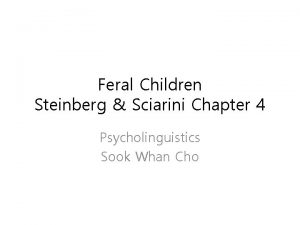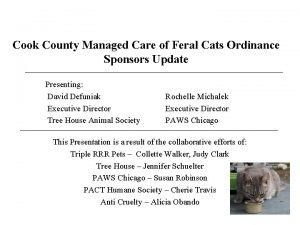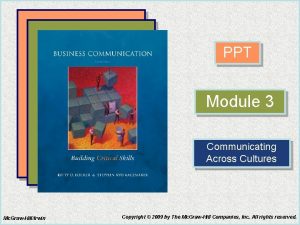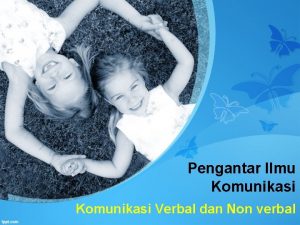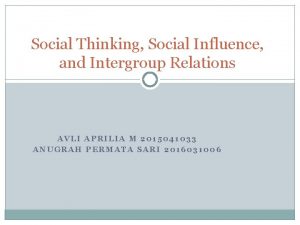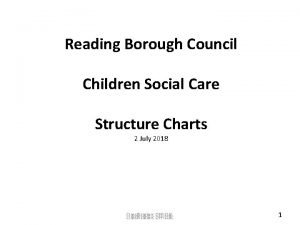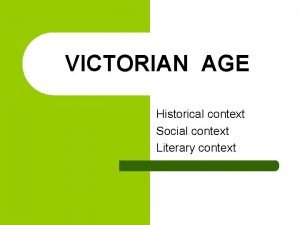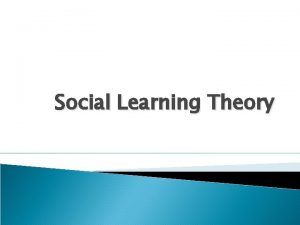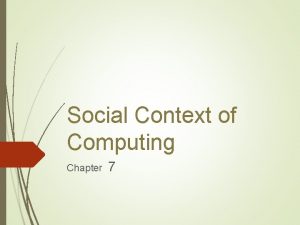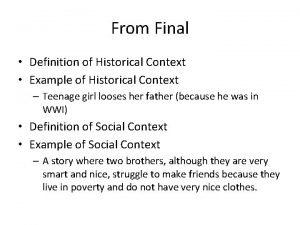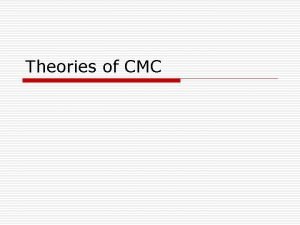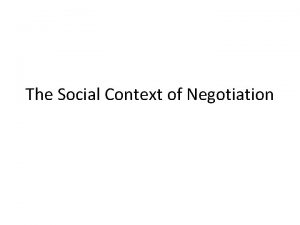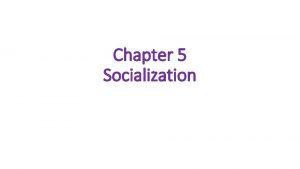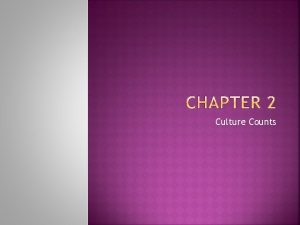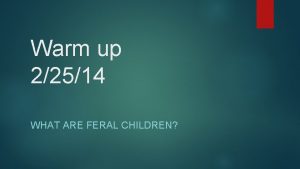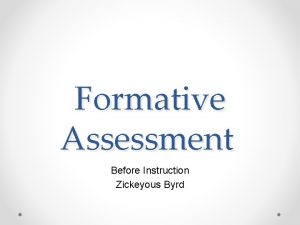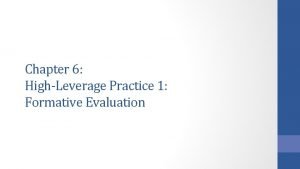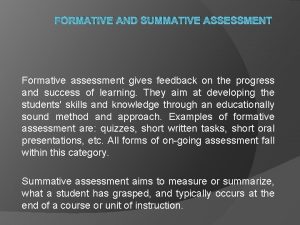Social Context as Formative Lessons from Feral Children




















- Slides: 20

Social Context as Formative Lessons from Feral Children – we need a social context to acquire language The primary social context for our language acquisition is the family: First words & sentences taught, progress monitored Motivation – progress celebrated Part of relationship development In what ways does the family context influence human development?

How does birth order help to explain personality and behaviour? Birth Order

People Like Me… Think about your birth order… Best thing about being first/second/middle/last born or being an ‘only child’ Worst thing… BIRTH ORDER ACTIVITY! Find people like you – and sit in a group Share stories Share with the class

Experiences First Born Middle Born - Independent - Terrible - Mature - Lots expected of you - Ignored - “Bad Kid” - Responsible - Responsibility - Test-Dummies Last Born Only Child Spoiled Inferiority complex - Hand-medowns - - - Problem Child - - Attention Seeker - - Reasonable - - Pushed to the side for younger siblings Get in trouble most - - Rebellious - Quiet Intellectuals - High standards from parents - Organized - Leaders - Neglected Manipulative Blamed for problems Acts like a “little adult” Babied Bossy Feisty - No standards… higher standards from parents Bubble-Wrapped kids Lonely PERFECT Spoiled Creative Pampered

Questionnaire Each question is coded either H, B, or T. For each question answered yes, write down the corresponding letter. At the end of the quiz determine which letter you have written down most often. Then read the results that follow. T I am most comfortable in leadership positions. H I often lack confidence in my abilities B I am a master at compromising. B I am excellent at seeing all sides of an issue. B I have been told that I an EXCELLENT negotiator. T I am very much a perfectionist and need things done right the first time. T I need to be in control at all times. H I often do things without considering the consequences of my actions. B Growing up, my peer group was EXTREMELY important to me, like a family. H I am very sociable and outgoing. H I have always enjoyed being the center of attention. T I tend to be overly-critical of others. T I am very conventional and like to follow the status quo. B I am known to be very flexible in all areas of my life. H I very much enjoy analyzing situations and other people. T I like things to be predictable.

Results. . . Try this quiz online. . . Any volunteers? If you answered mostly T's. . . your responses reflect characteristics most similar to a first born or only child. An only child has traits very similar to a first born, except only children's expectations may be even higher. They may tend to be even more critical of themselves, more of a perfectionist, etc. The characteristics of first-borns (noted on T answers) are usually more pronounced with only children. If you answered mostly H's. . . your responses reflect characteristics most similar to a youngest child. If you answered mostly B's. . . your responses reflect characteristics most similar to a middle child.

Birth Order Theory: Adler Alfred Adler (1870 -1937) – Key Ideas Striving for Perfection - a single "drive" or motivating force behind all our behaviour and experience; = 0 ur desire to fulfill our potentials Individual Psychology – “individual = “un-divided” – Adler chose this label to express that we should see people as wholes rather than parts Style of Life - Instead of talking about a person's internal personality traits, Adler preferred to talk about how you live your life, how you handle problems and interpersonal relations. "The style of life of a tree is the individuality of a tree expressing itself and moulding itself in an environment. We recognize a style when we see it against a background of an environment different from what we expect, for then we realize that every tree has a life pattern and is not merely a mechanical reaction to the environment. “

Alfred Adler Key Ideas cont’d: Social Interest / Social Concern - anyone "striving for perfection" can hardly do so without considering his or her social environment. As social animals, we simply don't exist, much less thrive, without others, and even the most resolute people-hater forms that hatred in a social context! Nature and Nurture - social concern was not simply inborn, nor just learned, but a combination of both: It is based on an innate disposition, but it has to be nurtured to survive. E. g. That it is to some extent innate is shown by the way babies and small children often show sympathy for others without having been taught to do so. Notice how, when one baby in a nursery begins to cry, they all begin to cry. Or how, when we walk into a room where people are laughing, we ourselves begin to smile

Alfred Adler Key Ideas cont’d Personality or lifestyle is established quite early in life: by about 5 Three Obstacles to a healthy personality Sense of inferiority - a few will overcompensate with a superiority complex, encouragement of loved ones will help some truly compensate Pampering - many children are taught/shown that they can take without giving. And society responds to pampered people in only one way: hatred Neglect - a child who is neglected/abused feels inferior because they are told and shown every day that they are of no value; they learn selfishness because they are taught to trust no one

Alfred Adler Birth Order Adler must be credited as the first theorist to include not only a child's mother and father and other adults as early influence on the child, but the child's brothers and sisters as well His consideration of the effects of siblings and the order in which they were born is probably what Adler is best-known for But, note that Adler considered birth-order another one of those heuristic ideas* that contribute to understanding people, but must not be taken too seriously (Note the popularity of birth order books and seminars… ie. NOT) * E. g. Schroedinger’s Cat

Birth Order Theory Birth Order Typical Characteristics - Only Child � Pampered and spoiled. � Feels incompetent because adults are more capable. � Is center of attention; often enjoys position. May feel special. � Self-centered. � Relies on service from others rather than own efforts � Feels unfairly treated when doesn't get own way. � May refuse to cooperate. � Plays "divide and conquer" to get own way.

Birth Order Theory Typical Characteristics - First Born � Is only child for period of time; used to being center of attention � Believes must gain and hold superiority over other children � Being right, controlling often important. � May respond to birth of second child by feeling unloved and neglected. � Strives to keep or regain parents' attention through conformity. If this fails, chooses to misbehave. � May develop competent, responsible behaviour or become very discouraged. � Sometime strives to protect and help others. � Strives to please.

Birth Order Theory First Born – Perceptions Attends to the rational & explicit side of issues Is not frustrated by details: "Concise, Precise and to the point!“ Tends to be "rule-governed“ "Should”, “Have to”, “Gotta”, “Oughta“ May restrict own spontaneity Characteristic Responses Active, purposeful, not impulsive, on target, "right" Good managers, future-oriented, likes organization Intellectual/analytical in 1 st response; learns in pieces

Birth Order Theory Second Child - Typical Characteristics Never has parents' undivided attention. Always has sibling ahead who's more advanced Acts as if in race, trying to catch up or overtake first child If first child is "good, " second may become "bad“ Develops abilities first child doesn't exhibit If first child successful, may feel uncertain of self and abilities May be rebel. Often doesn't like position Feels "squeezed" if third child is born May push down other siblings

Birth Order Theory Second Child – Typical Characteristics Cont. Has neither rights of oldest nor privileges of youngest Feels life is unfair Feels unloved, left out, "squeezed" Feels doesn't have place in family Becomes discouraged and "problem child" or elevates self by pushing down other siblings Is adaptable Learns to deal with both oldest and youngest sibling

Birth Order Theory Second Born - Perceptions Attends to the underlying issues Tunes in to the emotional side of people/issues Aware of the symbolic and imaginative meaning May restrict cognitive ability or focus May lack clear mode to verbally represent their experience Sometimes has difficulty sorting out and labeling own feelings Feels as well as thinks in polarities (mood swings)

Birth Order Theory Second Born – Characteristic Responses Lives feelings Acts on feelings vs thoughts; feels wiped out Will act out behaviorally Polarize: intellectual/tasks; irrational/irresponsible In stress: Red Cross, stuff, or ignore Professions: where intuition is valued artists, actors, musicians Learns best through metaphor, symbolically Needs structure, but may not know or ask for it

Birth Order Theory Middle Child – Perceptions Sees most things, people in terms of relationships Sensitive to the relationship needs of others Characteristic Responses Feels confined and trapped if no perceived choices Wants options open, May look like a procrastinator Can disappear into introspection Can appear to be uncaring, apathetic, carefree Sometimes feels overwhelmed--too much data, too many choices May look uninvolved, but just trying to maintain safety to make choices Professions: counselors, mediators, negotiators On the one hand / on the other

Birth Order Theory Last Born Child - Typical Characteristics Behaves like only child Feels every one bigger and more capable Expects others to do things, make decisions, take responsibility Feels smallest and weakest. May not be taken seriously Becomes boss of family in getting service and own way Develops feelings of inferiority or becomes "speeder" and overtakes older siblings Remains "The Baby“ - places others in service If youngest of three, often allies with oldest child against middle child

Birth Order Theory Birth Order and Marriage Leman’s (2000) research suggests the ideal and not so ideal birth order pairs for long-term romantic relationships The absolute worst birth order pairs are those within the same birth order (e. g. , two first-borns/’onlies’, two middles, or two youngest) Two first-borns together equals a lifelong power struggle Two middles are a bad match because communication will be lacking due to avoidance of conflict, a natural trait of middle children Two babies are not a great match because youngest children usually do not delegate responsibilities well, and assume that someone else will pick up the slack. Best to marry outside your birth order, esp. to marry the most opposite birth order position
 Feral child edik
Feral child edik Cook county feral cat ordinance
Cook county feral cat ordinance Rock pigeon vs feral pigeon
Rock pigeon vs feral pigeon Nonagist
Nonagist High context vs low context culture ppt
High context vs low context culture ppt Example of presupposition
Example of presupposition Soal essay komunikasi nonverbal
Soal essay komunikasi nonverbal Social thinking and social influence in psychology
Social thinking and social influence in psychology Social thinking social influence social relations
Social thinking social influence social relations Reading borough council children's social services
Reading borough council children's social services Historical background of victorian age
Historical background of victorian age James zwerg
James zwerg Social context of computing
Social context of computing Social context definition
Social context definition Social context of computing
Social context of computing Social context definition
Social context definition Social context
Social context Social context definition
Social context definition Context of othello
Context of othello Side model cmc
Side model cmc Context of negotiation
Context of negotiation
